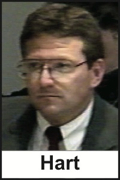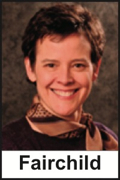Rascals case in brief
In the beginning, in 1989, more than 90 children at the Little Rascals Day Care Center in Edenton, North Carolina, accused a total of 20 adults with 429 instances of sexual abuse over a three-year period. It may have all begun with one parent’s complaint about punishment given her child.
Among the alleged perpetrators: the sheriff and mayor. But prosecutors would charge only Robin Byrum, Darlene Harris, Elizabeth “Betsy” Kelly, Robert “Bob” Kelly, Willard Scott Privott, Shelley Stone and Dawn Wilson – the Edenton 7.
Along with sodomy and beatings, allegations included a baby killed with a handgun, a child being hung upside down from a tree and being set on fire and countless other fantastic incidents involving spaceships, hot air balloons, pirate ships and trained sharks.
By the time prosecutors dropped the last charges in 1997, Little Rascals had become North Carolina’s longest and most costly criminal trial. Prosecutors kept defendants jailed in hopes at least one would turn against their supposed co-conspirators. Remarkably, none did. Another shameful record: Five defendants had to wait longer to face their accusers in court than anyone else in North Carolina history.
Between 1991 and 1997, Ofra Bikel produced three extraordinary episodes on the Little Rascals case for the PBS series “Frontline.” Although “Innocence Lost” did not deter prosecutors, it exposed their tactics and fostered nationwide skepticism and dismay.
With each passing year, the absurdity of the Little Rascals charges has become more obvious. But no admission of error has ever come from prosecutors, police, interviewers or parents. This site is devoted to the issues raised by this case.
On Facebook
Click for earlier Facebook posts archived on this site
Click to go to
Today’s random selection from the Little Rascals Day Care archives….
Click for earlier Facebook posts archived on this site
Click to go to
Today’s random selection from the Little Rascals Day Care archives….
Bill Hart played by his own (poker) rules
 June 8, 2012
June 8, 2012
“The duty of the prosecutor is to seek justice, not merely to convict.”
– American Bar Association
“The primary responsibility of prosecution is to see that justice is accomplished.”
– National District Attorneys Association
“If you were playing poker, would you be playing with your full hand
showing?”
– Bill Hart, special deputy attorney general, defending his unwillingness
to share evidence with the Little Rascals defense
‘Long history of panic’ extended to day-care cases
 Feb. 6, 2013
Feb. 6, 2013
“Panic provides a rationale for action, sometimes overreaction or even manipulation. As such, it is the subject of heated accusation and denial that can create a swirl of confusion and frustration.
“Nonetheless, some lessons stand out in the long history of panic. There is no basis for imagining that the frenzied 19th century reactions to disease are a slumbering beast waiting to be roused. Too much government infrastructure and information stand between populations and unfettered panic….”
– From “A Brief History of Panic” by Amy L. Fairchild, David Merritt Johns and Kavita Sivara Makrishnan, public health researchers at Columbia University (the New York Times, January 28, 2013)
“Frenzied…. reactions” to disease epidemics may have subsided since the 19th century, but they were crucial in animating the day-care ritual-abuse prosecutions of the 1980s and ’90s. And “government infrastructure” – that is, district attorneys’ offices – wasn’t a deterrent but an accelerant!
Prosecutors cling to ‘child sexual-abuse accommodation syndrome’

Kadvany
Feb. 9, 2018
“Both prosecution and defense [in a trial in Palo Alto, Calif.] called expert witnesses to testify to ‘child sexual-abuse accommodation syndrome’….
“Roland Summit, a southern California psychiatrist, coined the term in 1983. He defined the syndrome through five categories: secrecy, helplessness; entrapment and accommodation; delayed, unconvincing disclosure; and retraction. The categories describe how victims often do not resist the abuse because of power dynamics in the relationship with an adult, often delay disclosing the abuse and may change their stories due to pressure or guilt….
“Blake Carmichael, a clinical psychologist at the University of California, Davis, testified for the prosecution that child sexual-abuse accommodation syndrome is not a diagnosis but rather a set of concepts that provide context for a child’s experience of sexual abuse. He testified that research supports Summit’s original claims.
“By contrast, William O’Donohue, a clinical psychologist at the University of Nevada, Reno, testified for the defense that Summit’s paper is ‘junk science’.
“O’Donohue co-authored a literature review of Summit’s work that determined the syndrome is not a scientific theory grounded in research. O’Donohue noted that a second article Summit published in the 1990s described child sexual-abuse accommodation syndrome as his ‘clinical opinion’ and a ‘pattern’ rather than a diagnosable condition.”
– From “Former teacher denies sex-abuse allegations” by Elena Kadvany in Palo Alto Weekly (Feb. 7)
So here we are, 35 years after Roland Summit fanned the flames in the McMartin Preschool case, and prosecutors are still using his cockamamie conceit to win over jurors. It’s not just on the internet that no bad idea ever dies….
![]()
Where do you stand, Edenton, on the Little Rascals case?
May 17, 2018
In recent years the Little Rascals Day Care case, probably the most significant event in Edenton in the 20th century, seems to have been a taboo subject in the local Chowan Herald and in the Daily Advance of Elizabeth City. I’m grateful that the Herald has published my letter to the editor in this week’s edition:
 “In the 1990s the town of Edenton was torn apart by the Little Rascals Day Care case, in which seven local people were accused of ‘satanic ritual abuse’ of dozens of children. The case attracted reporters from the New York Times and Washington Post and received eight hours of documentary coverage on PBS’s “Frontline” series. Co-owner Bob Kelly’s trial was the longest and costliest in North Carolina history. After Kelly served six years in prison and cook Dawn Wilson three, their convictions were overturned.
“In the 1990s the town of Edenton was torn apart by the Little Rascals Day Care case, in which seven local people were accused of ‘satanic ritual abuse’ of dozens of children. The case attracted reporters from the New York Times and Washington Post and received eight hours of documentary coverage on PBS’s “Frontline” series. Co-owner Bob Kelly’s trial was the longest and costliest in North Carolina history. After Kelly served six years in prison and cook Dawn Wilson three, their convictions were overturned.
“The Duke University Law School Library recently opened to researchers an exhibit and archive on the Little Rascals case, including the transcript of Bob Kelly’s trial and numerous other documents. ‘The case is one example of the preoccupation with perceived abuse taking place at daycares and preschools in the 1980s and 1990s,’ Duke wrote in its announcement. ‘Often, these cases also involved allegations of Satanism or devil worship. Like the Little Rascals case, most of these daycare abuse accusations turned out to be false.
“Today no reputable psychologist, social scientist or legal expert will argue otherwise. From Wikipedia to the National Registry of Exonerations, the defendants in cases such as Little Rascals are recognized as innocent victims of a bizarre ‘moral panic’ that bore striking similarities to the Salem witch hunts 300 years earlier.
“During the years-long prosecution of the Edenton Seven, townspeople were divided family vs. family, friends vs. friends. Today the former Little Rascals Day Care Center is being converted into housing – is that what would happen if townspeople believed it was the site of mass molestation of their children? So where now does Edenton stand?”
![]()









0 CommentsComment on Facebook